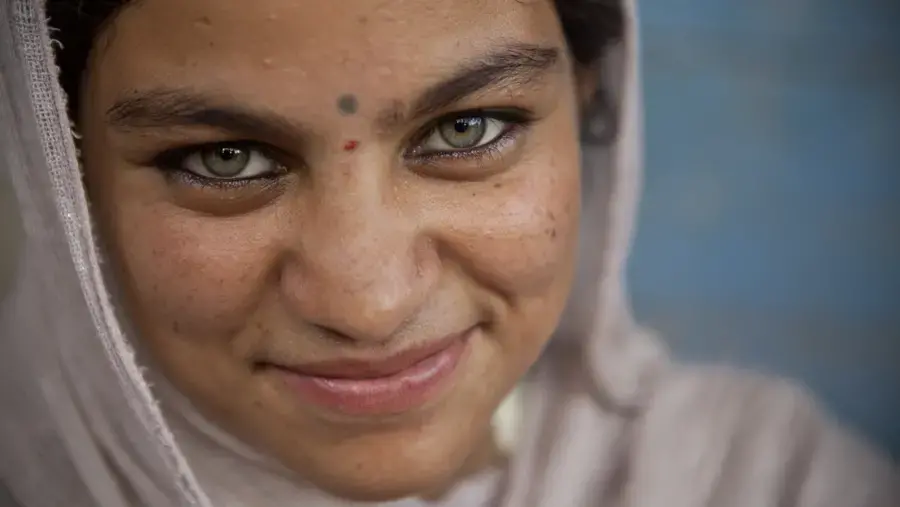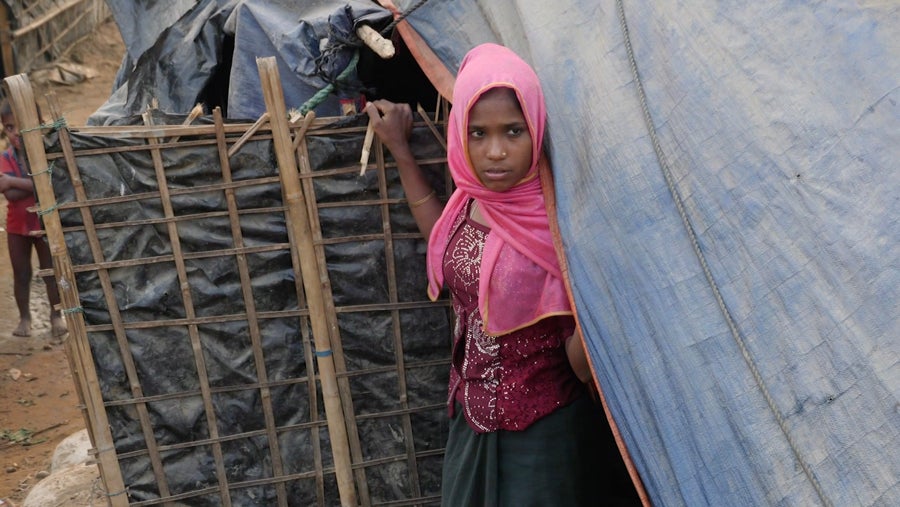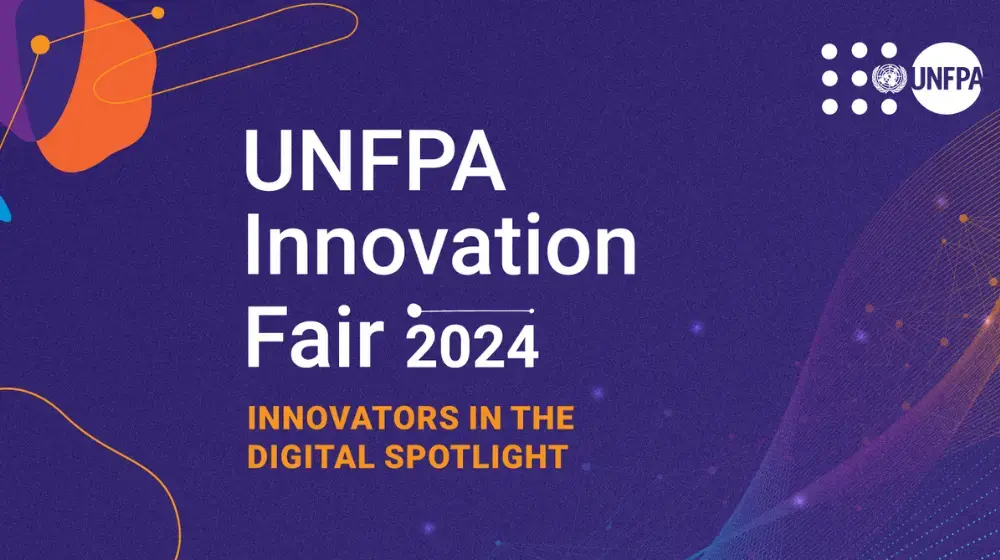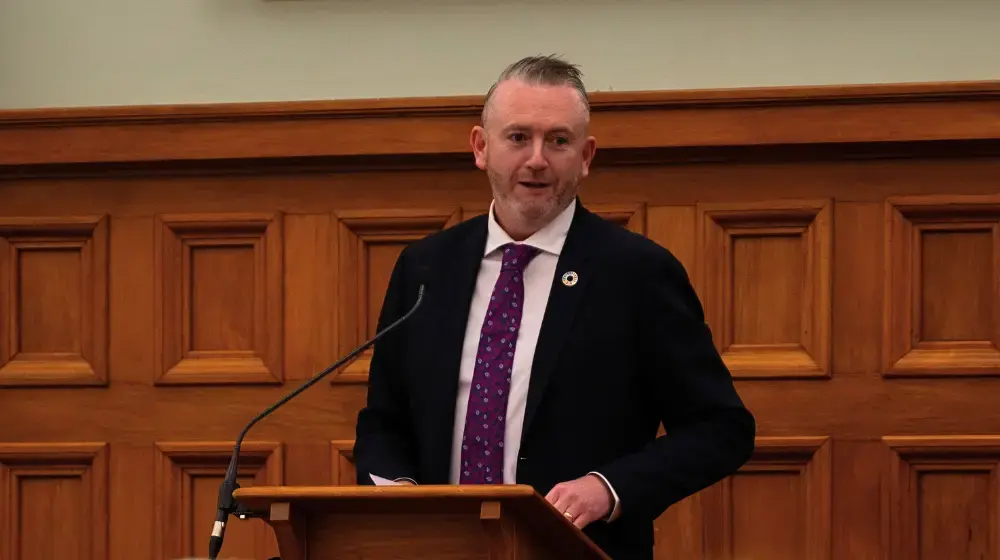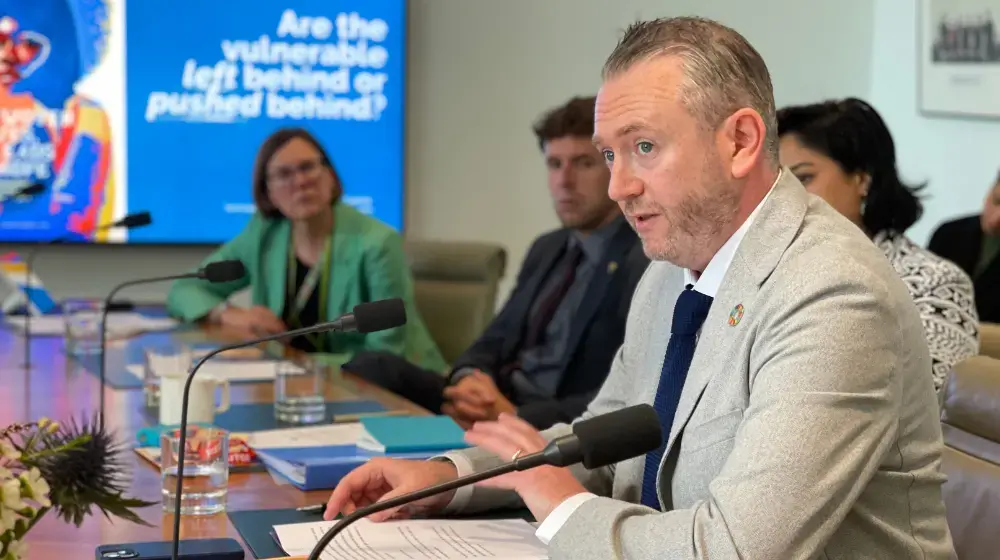Menstruation maters
Menstruation matters
Over 26 million girls and women of menstruating age are estimated to be displaced globally. The majority of them face barriers to accessing menstrual health information, services to treat menstrual symptoms and disorders, basic menstrual hygiene supplies and private latrine and washing facilities.
For millions of women and girls, menstruation- the most natural of reproductive cycle functions- can equate to abuse, stigma. missed opportunity and loss of dignity, particularly during disasters. The onset of menstruation may increase their risk of sexual violence and harmful practices like child marriage, violations of bodily autonomy or banishment to menstruation huts, Women and girls may miss out on school and actively participating in and rebuilding their communities after a disaster due to pain or discomfort, stigma, and lack of access to menstrual supplies and safe washing facilities.
UNFPA supports sexual and reproductive rights for all. Women and girls have the right to menstruate without missing out or being cast out, without feeling fear or shame, and without being exposed to more vulnerabilities or treated like less. Living with dignity, even during disasters, is a fundamental human right that should be preserved. Period.
This collection of portraits and stories from across the Asia Pacific region celebrates the advocates working to help all women and girls maintain dignity during menstruation.
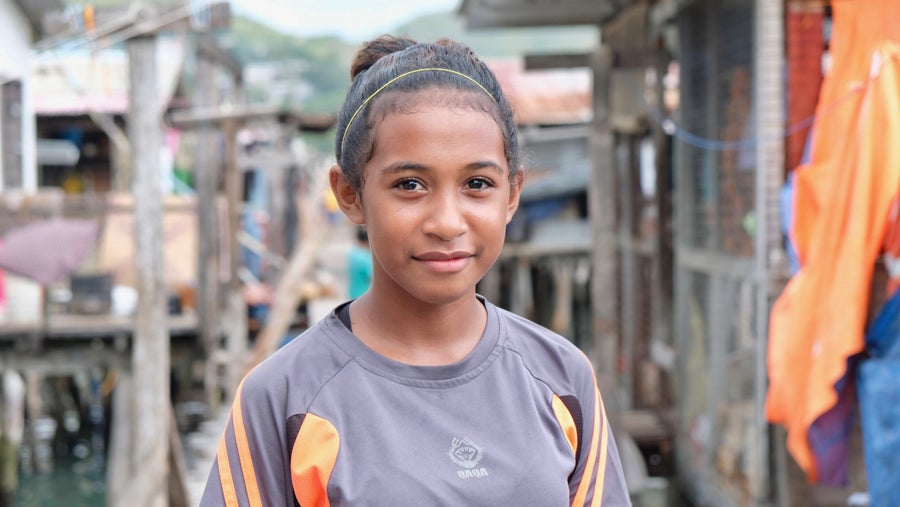
Papua New Guinea: Helen lives in Hanuabada village near Port Moresby. Water is limited to a tap at the end of the jetty where she lives with her family, their house perched over the sea. Millions of girls like Helen live with inadequate sanitation even before a disaster, and when extreme storms or a pandemic disrupts their fragile normalcy, menstrual health is too often not a top priority. ©UNFPA/Rose
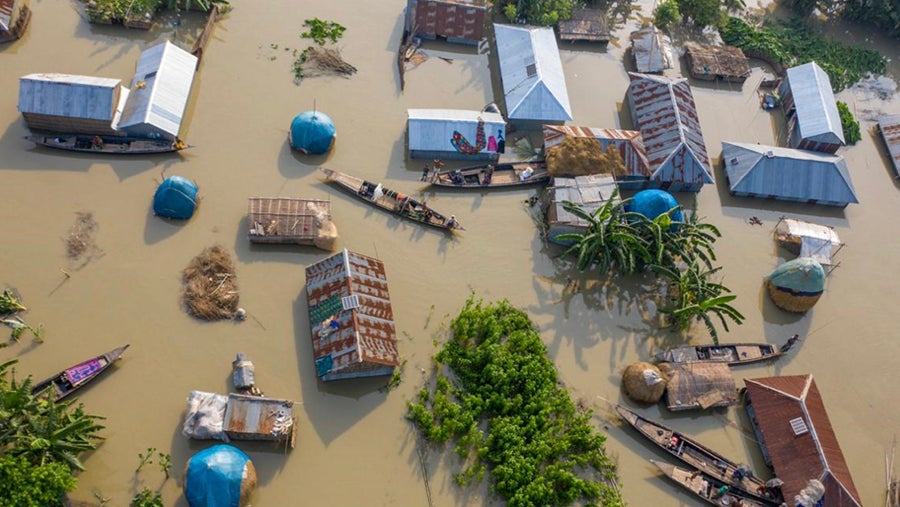
©UNFPA/Bangladesh
When a disaster strikes, the unique needs of women and girls are often overlooked- particularly
their menstrual health.
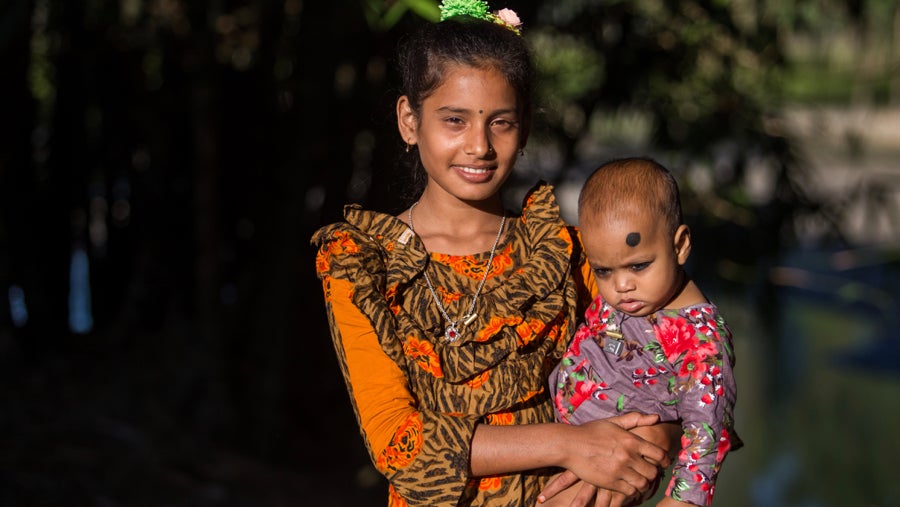
Bangladesh: "In our villages, we do not receive menstrual health education, because menstruation is not an issue we commonly talk about,” says Amina from Jamalpur. “No one worries about the pain girls go through. We are expected to work the same way we do every day, during menstruation as well. I have always seen my mother, friends and sisters suffer from terrible pain and weakness, but they were too shy to express it.”
Amina says the needs of women and girls are often not considered. “In our household, men are always treated better,” she says. “They are given better food, because they earn money for the family, even more so during the pandemic. However, it is also important for girls to eat properly, especially when we are menstruating as we lose blood and the cramps hurt a lot.”
Through community youth volunteers, Amina has learned about better nutrition.
“Like many others in our village, I did not know this before the volunteers from the UNFPA project came here and told us about the importance of eating properly,” she says. “They brought some flashcards, which I took home and shared with my mother. She took my words seriously and now my family makes me eat properly during my period." ©Plan International Bangladesh
In 2020 UNFPA provided adolescent and youth friendly sexual and reproductive health services for 310,940 adolescent girls and boys in 10 countries across the region during humanitarian response
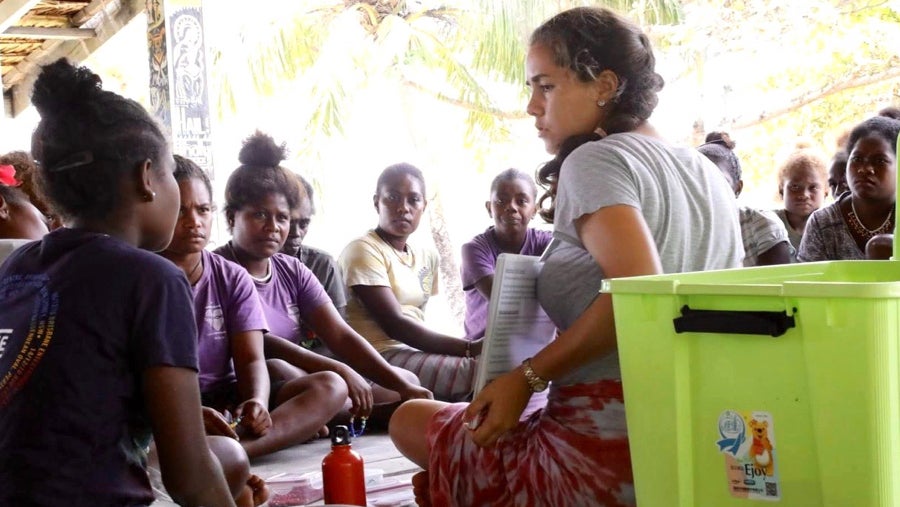
Solomon Islands/Fiji: “It's so uplifting, I'm inspired every time” says Zillah. She works with communities in Fiji and the Solomon Islands to facilitate conversations about menstrual health. Her inclusive, Pacific approach creates a safe space for women and girls to speak openly about something that is often taboo. READ MORE
“In rural areas they bury or burn the rubbish or throw it into the sea. If you have pads, diapers or plastic products all going into the ocean, that's not good.”
-Zillah Douglas, Solomon Islands/Fiji
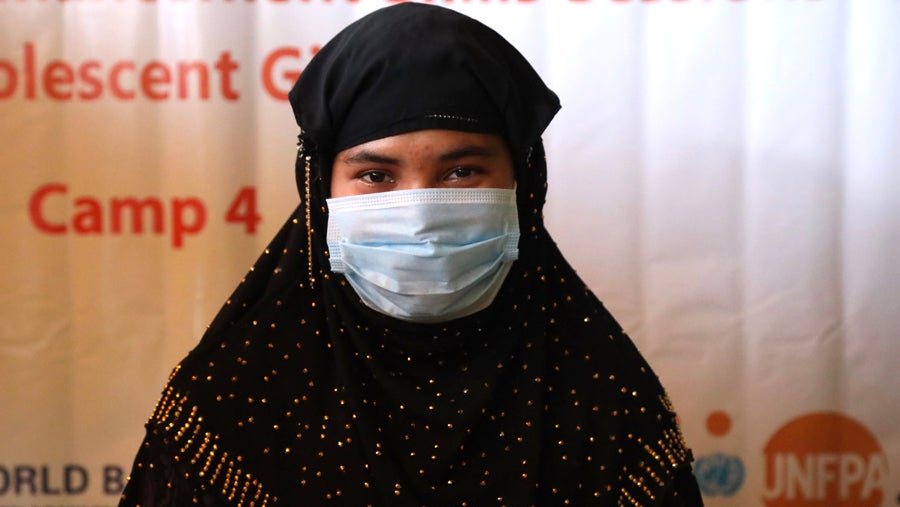
Bangladesh: “Women and girls can understand my pain as they face the same thing,” says Hotiza. She is a youth mentor of the Girl Shine Programme in Cox’s Bazar Refugee Camp. She learned about menstrual health in one of the UNFPA-supported women-friendly spaces and now inspires girls to speak openly about their bodies and their unique needs.
“When I go back home I talk about this issue with my friends and young girls who have no idea about menstrual hygiene,” she says. “They learn this topic and my mum sometimes listens to our discussions. She can learn about this as well.”
Hotiza has conversations with girls who are too timid or are not permitted to attend the sessions. “I teach my neighborhood girls, who don’t come to women friendly spaces.”
Hotiza works as a youth mentor of the Girl Shine Programme at the centre and engages directly with girls who are curious about menstrual health.
“I work with adolescent girls, ages 10-19,” she says. “We discuss the menstruation cycle, bodily changes during adolescence, decision-making, confidence and what will happen if someone marries before 18 years old.”
Hotiza is grateful that she can share her knowledge to empower girls in her community. “I really like that I can support others,” she says. “I didn’t get a chance to learn these topics back in Myanmar but here I got the opportunity to learn and I can teach others.”
Despite the progress in speaking with girls about menstruation, she says she still cannot raise the issue at home. “It’s not possible to talk about this issue with my father or brother,” she says.
Hotiza says the issue is culturally sensitive and women need their own space to talk about the challenges of menstrual health.
“How would a man understand women’s pain?” she says. “They don’t have this kind of pain.” ©UNFPA/Bangladesh/Fahima Tajrin READ MORE
“When I go back home I talk about this issue with my friends and young girls who have no idea about menstrual hygiene,”
-Hotiza, Cox's Bazar, Bangladesh
VIDEO Menstruation Matters: putting women and girls first in emergencies WATCH THE VIDEO
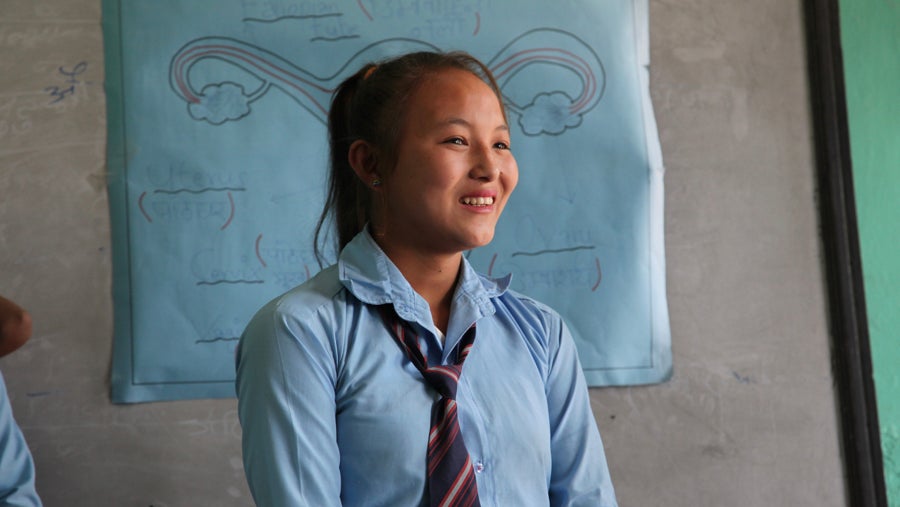
Nepal: Through comprehensive sexuality education, UNFPA reaches girls with information about their bodies and menstrual health to support them in maintaining their health and wellbeing during emergencies. ©UNFPA Nepal/Taylor
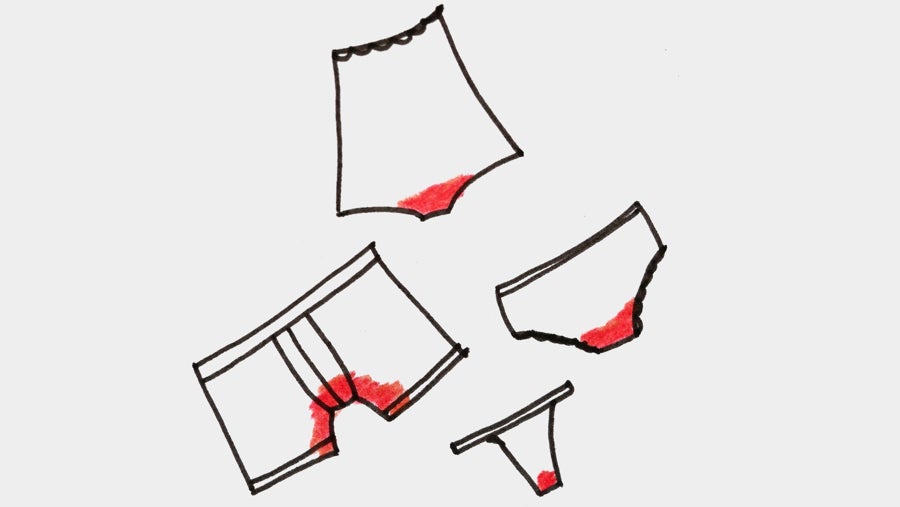
Anxiety and embarrassment around bloodstains and worry about leaks prevent girls and women from benefiting from aid distributions and in helping to rebuild their communities after an emergency. ©Vulvani
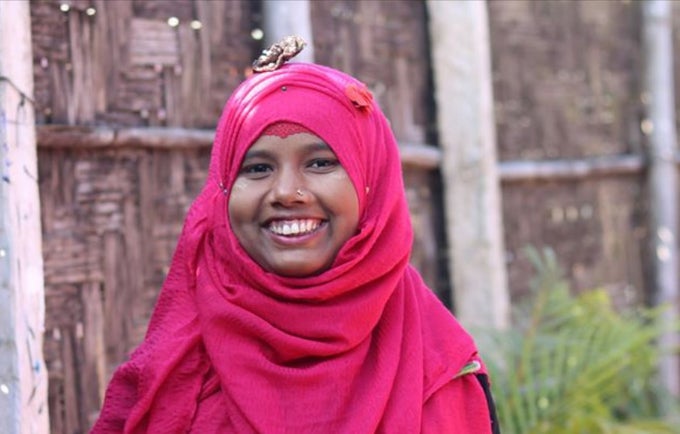
Bangladesh: “I was only fourteen years old when my family settled at the Cox’s Bazar,” says Asmahan from the Kutupalong Refugee Camp. “We had no shelter or food, and I did not know how to manage my ‘mashik’ (menstruation). This was something all of us girls living in camps had to go through.”
“Sometimes we had to dig a hole for underground water, since we had no access to clean water,” Asmahan says. “One day, community volunteers visited our camp and informed my parents about UNFPA’s ‘Girl Shine’ sessions, which would later change my life.”
She says her mother was not sure at first, but then let her join. “After hearing more about it, she let me join the sessions,” she recalls. “I began regularly attending sessions with other girls in the camps. I was very interested in the topics that were discussed, which included menstrual health and hygiene, as well as child marriage, and other important issues.”
Asmahan learned about the important health consequences of menstrual hygiene.
“I now know that the cloth I had been using during my period was unhygienic, and that it could lead to infections,“ she says. “I also now know how to track my cycle and how to better manage my menstruation – by taking a shower every day during my period, washing menstrual clothes with soap and water, drying them in the sun, and how to use and dispose of sanitary napkins.”
She says the sessions helped her open up a discussion with her mother about the myths of menstruation. ”Back in the day, my mother and grandmother didn’t allow me to go outside when I had my period,” she recalls. “I used to sit in isolation the whole time. I was only allowed to go to the toilet in the night to change my menstrual cloth. They believed that I should eat very little food and drink less water to avoid heavy menstruation. I now realize that all these were wrong beliefs that could have affected my health.”
Asmahan says the solidarity of learning with other girls has been helpful and now she shares her knowledge with younger girls.
“I started sharing my learnings with other girls in the camps, who hadn’t been part of the sessions,” she says. “They too are now more aware of their health and hygiene. I always remind them that our period is natural and normal, and it is not something that we should hide or be ashamed of.” READ MORE
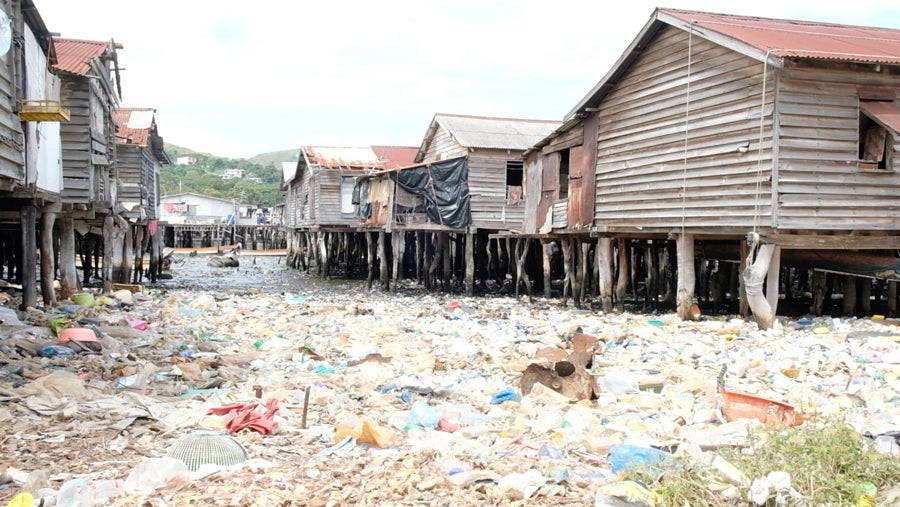
Papua New Guinea: Many informal settlements near Port Morebsy lack adequate sanitation and rubbish collection so the use of disposable pads only creates more problems. In a country where women’s needs are often disregarded, discussing menstrual health and taking action to support women and girls remains a significant challenge. ©UNFPA/Rose
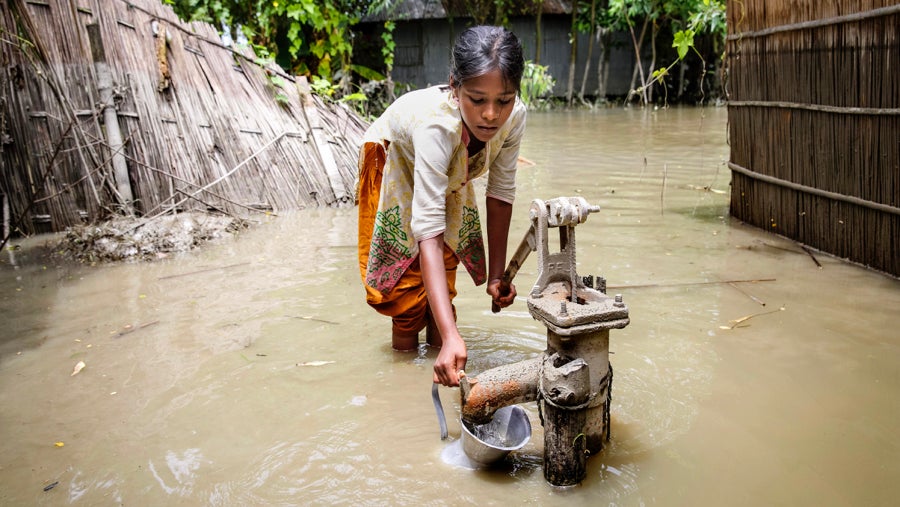
Bangladesh: When a disaster strikes, women and girls face even greater barriers managing their menstruation given the loss of privacy and safety often associated with living in emergency contexts. UNFPA supports women and girls affected by disasters to uphold their dignity by ensuring access to menstrual materials and supplies such as disposable and reusable sanitary pads, underwear and supportive materials such as soap and buckets for washing.
Last year, UNFPA distributed 203,280 dignity kits, including menstrual hygiene management kits, to women and girls across 15 countries in the Asia Pacific region
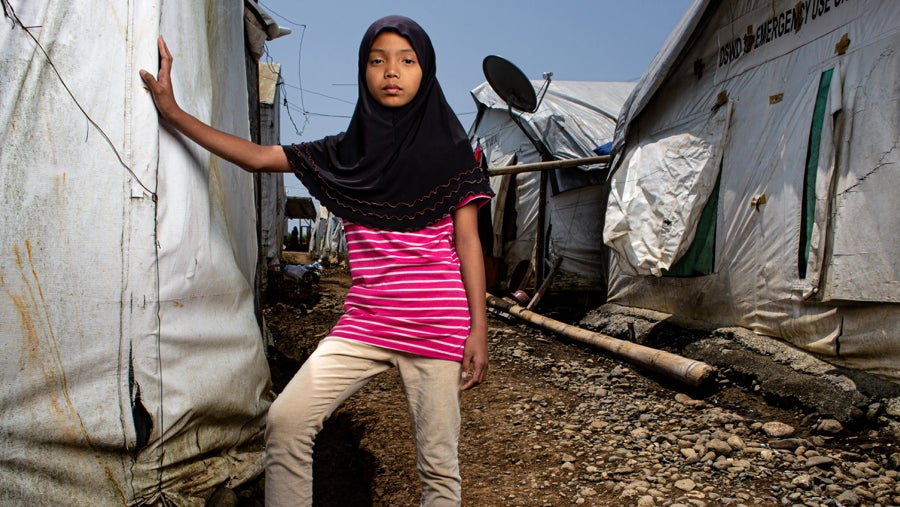
Philippines: Jalaisa, 12, stands next to her family’s temporary home in the tented evacuation site on the outskirts of Marawi. She is now attending a temporary school at the evacuation site. “I miss my classmates and friends most,” Jalaisa says. “I don’t know where they are now.”
Following a crisis, the unique needs of women and girls are often overlooked. This includes the need for menstrual and hygiene materials such as pads and underwear, and continued education on menstruation and menstrual health. Ensuring that menstrual health supplies are readily available and that temporary schools provide safe and clean latrines and washing facilities will help girls stay in school and continue their education, even during a crisis. ©UNI212452/Marko Kokic
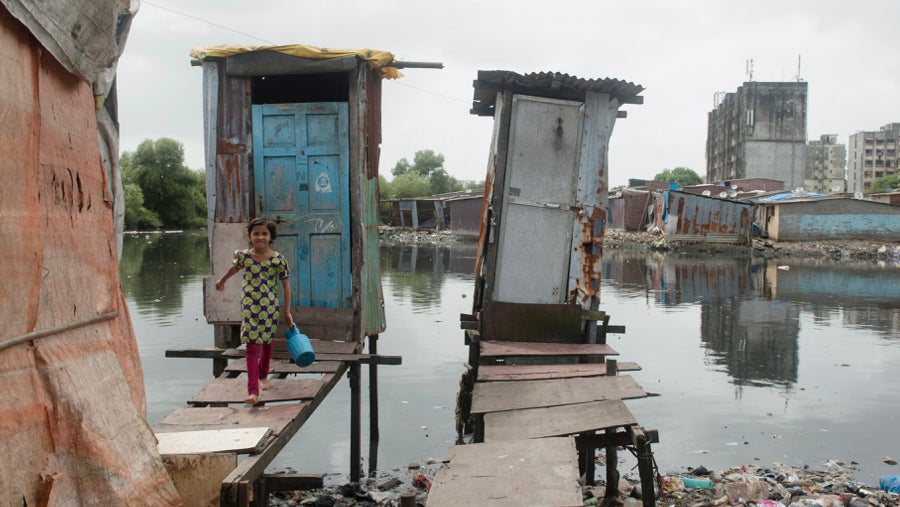
India: Makeshift toilets like these in Mumbai are especially vulnerable to the impacts of floods and disasters. Ensuring access to safe, private and clean latrines and washing facilities to maintain menstrual hygiene is critical following a disaster, but imporving existing systems in informal settlements remains a priority across the region. ©UN055381/Manpreet Romana
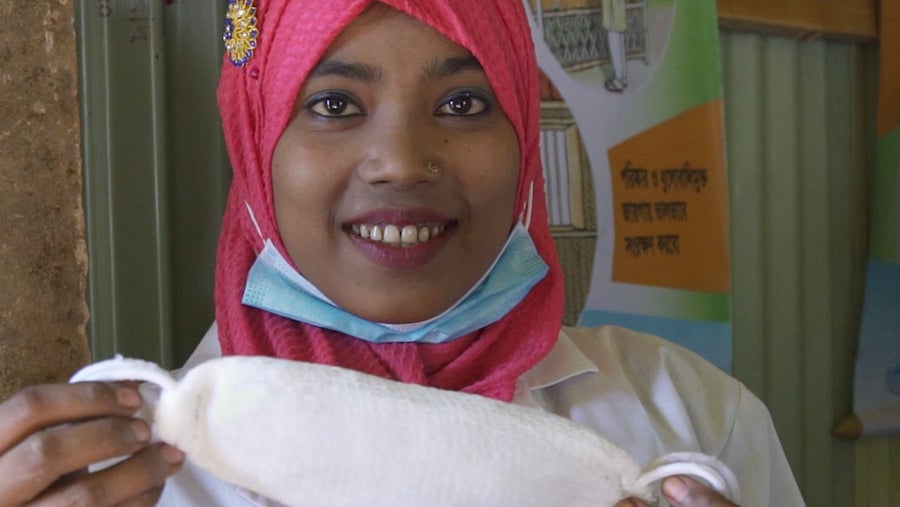
Bangladesh: Getting a period in a crowded refugee camp is not easy for teenage girls and women, especially when there is a lack of available hygienic menstruation supplies and access to safe and private toilets to wash themselves and their menstrual cloths. Many girls report that the shared latrines they use are often uncomfortable, dirty and without privacy, and that they feel unsafe using toilets at night, for fear of being assaulted or kidnapped.
The Sanimart project works to promote low-cost menstrual hygiene management kits for adolescent girls. The objectives of the Sanimart approach is to enrich knowledge and skills of adolescent girls in the Rohingya communities on the production of sanitary napkins and its use, to promote use of safe water and sanitation, on personal and menstrual hygiene practices and to develop entrepreneurship.
There are four Sanimart centres established in the makeshift settlements in Cox’s Bazar, which include Kutupalong, Balukhali, Leda and Shamlapur. Each and every Sanimart is equipped with a number of relevant machinery and equipment to run the centre. Necessary technical training has been provided to around 40 adolescents, 10 from each centre, on the operational mechanism of the Sanimart. VIDEO
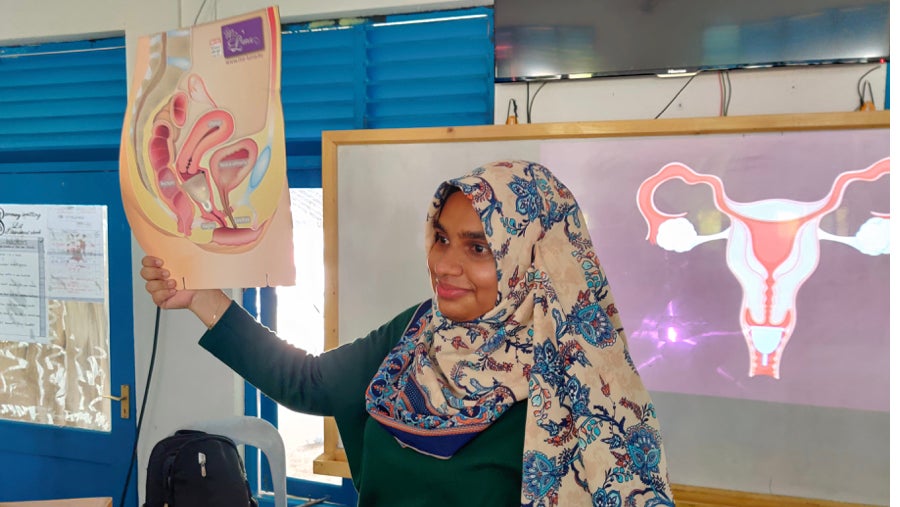
Women and girls are reached with information to empower them to manage their menstruation with dignity. Information and education contributes to body literacy, which is an important part of sexual and reproductive health education.
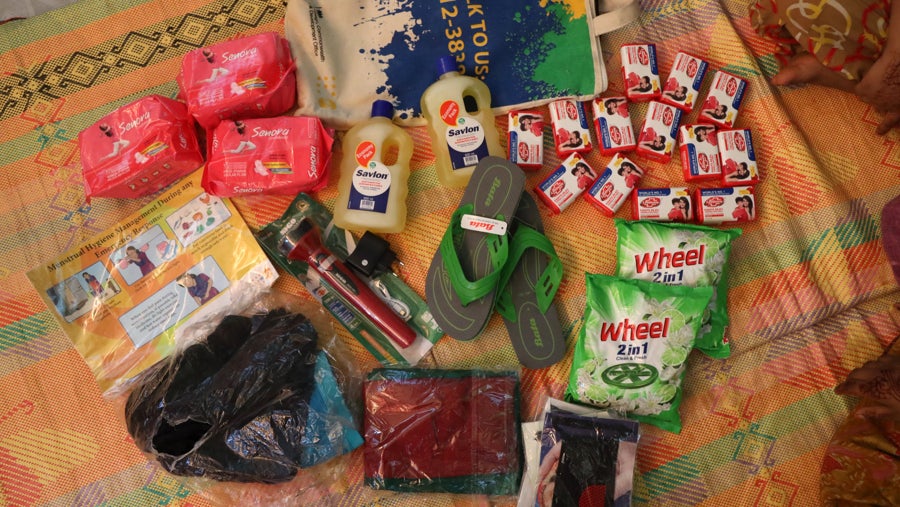
Menstrual Hygiene Management Kit from Bangladesh which includes soap, laundry powder, disposable pads, underwear, a flashlight, footwear and information on how to maintain menstrual hygiene. ©UNFPA/Bangladesh/Fahima Tajrin
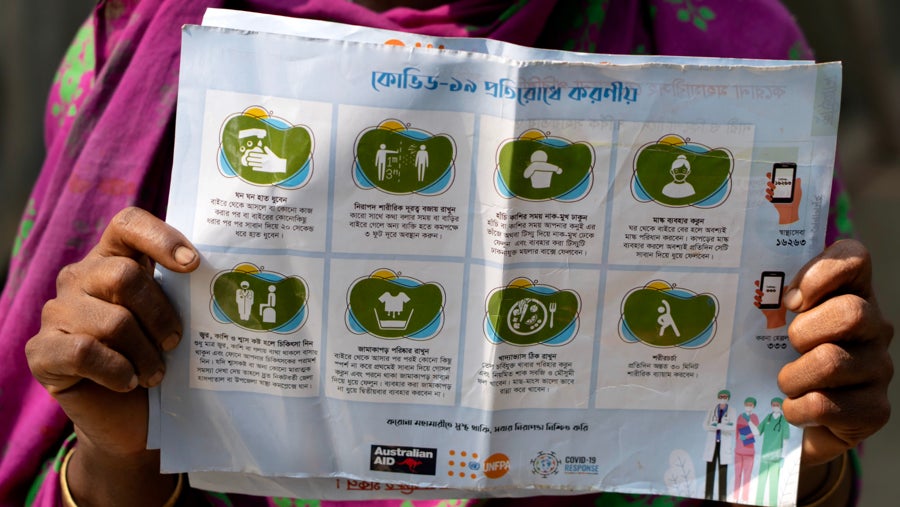
Dignity Kits contain information on sexual and reproductive health and rights and gender-based violence and includes information on what services are available and how to access them. ©UNFPA/Bangladesh/Fahima Tajrin
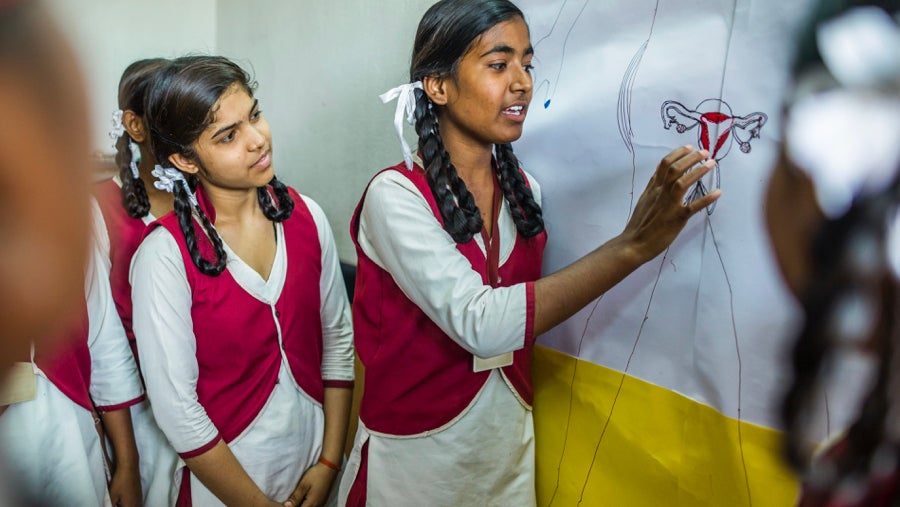
India: Adolescent girls showcase a drawing of the female anatomy while they participate in a body-mapping activity where they openly talk about menstruation during a session on menstrual health and hygiene management for adolescents girls at Kasturba Gandhi Balika Aavasiya Vidyalaya (KGBV) in Patratu. ©UN0214883/Prashanth Vishwanathan
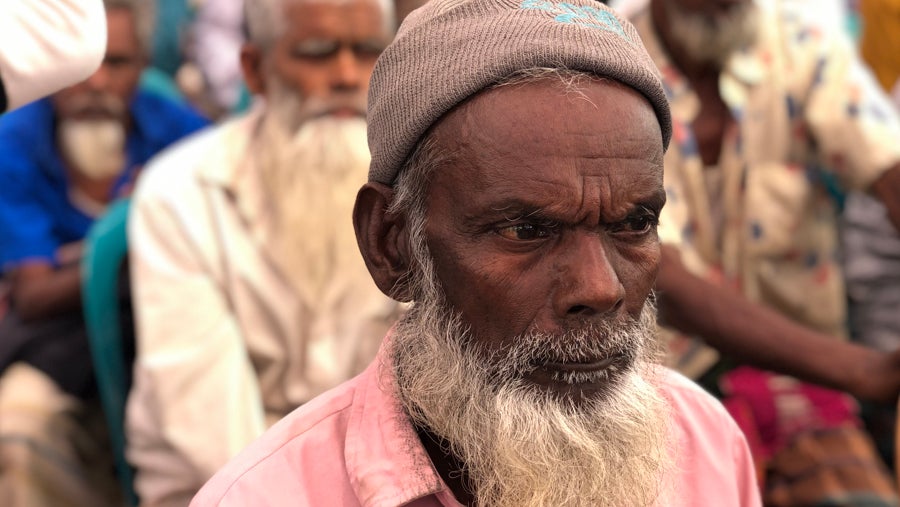
UNFPA sensitises men, boys, girls, and women in order to dispel harmful cultural or social norms, taboos and misconceptions around menstruation.
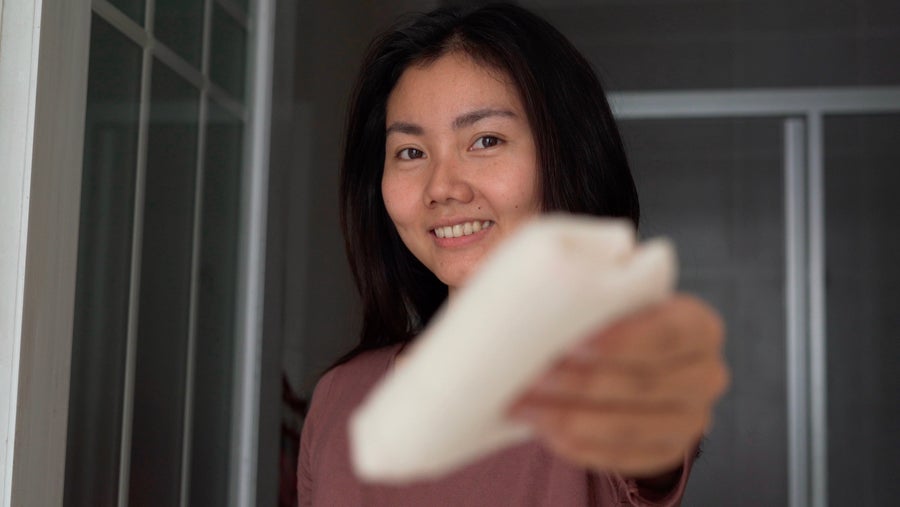
Cambodia: Sovanvotey Hok, aka Green Lady Cambodia, is an advocate for women’s health and menstrual hygiene management in a country where cultural barriers can often slow progress. She attended the #ICPD25 summit in Nairobi in 2019, where she was inspired to start her own project to deliver youth-created sexuality education to facilitate discussions about menstruation in schools across the country.
READ MORE
“Girls worry about blood – menstrual blood, period shaming and body shaming."
-Sovanvotey Hok, aka Green Lady Cambodia
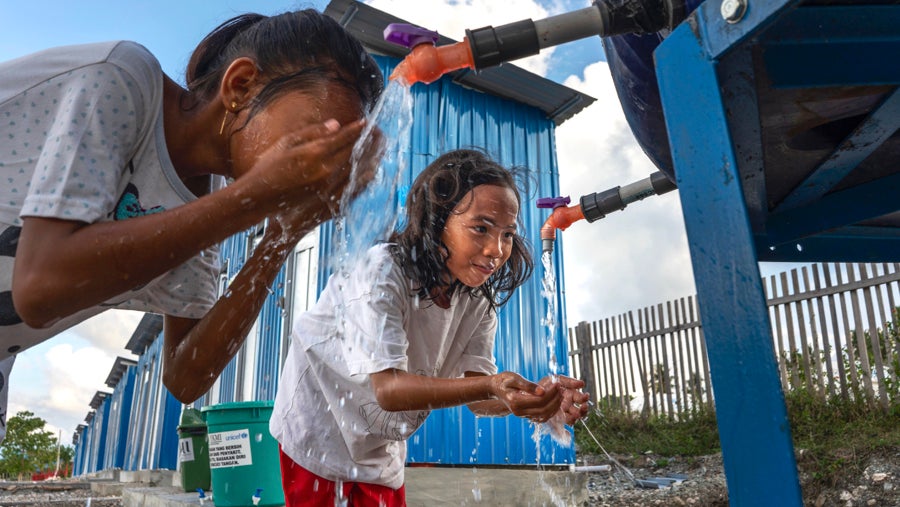
Indonesia: Children clean themselves near toilets in temporary shelters for survivors of the 2018 earthquake and tsunami in Central Sulawesi. UNFPA works with WASH partners to ensure that crisis affected girls have access to safe, private and clean latrines and washing facilities with water for changing, washing and drying menstrual materials. Ensuring that facilities are separated for boys/men and girls/women, located in safe areas with sufficient lighting and have locks on the door are critical to prevent gender-based violence. ©UN0267784/ Fauzan
UNFPA trained 263,189 men and women, including youth facilitators, on various aspects of sexual and reproductive health, including on menstrual health, and gender-based violence in 14 countries in the Asia Pacific region in 2020
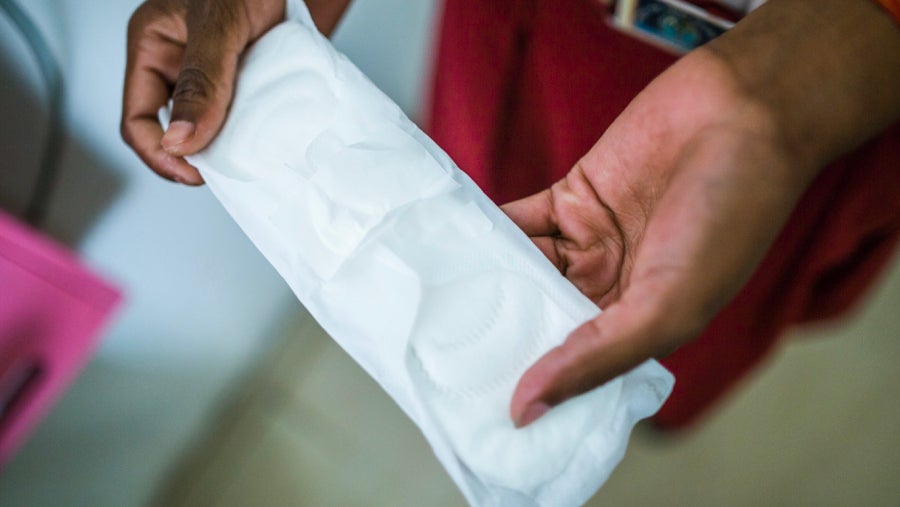
India: An adolescent girl holds a sanitary napkin during a session on life skills education as part of the menstrual health and hygiene management for adolescents girls project. ©UN0214841/Prashanth Vishwanathan
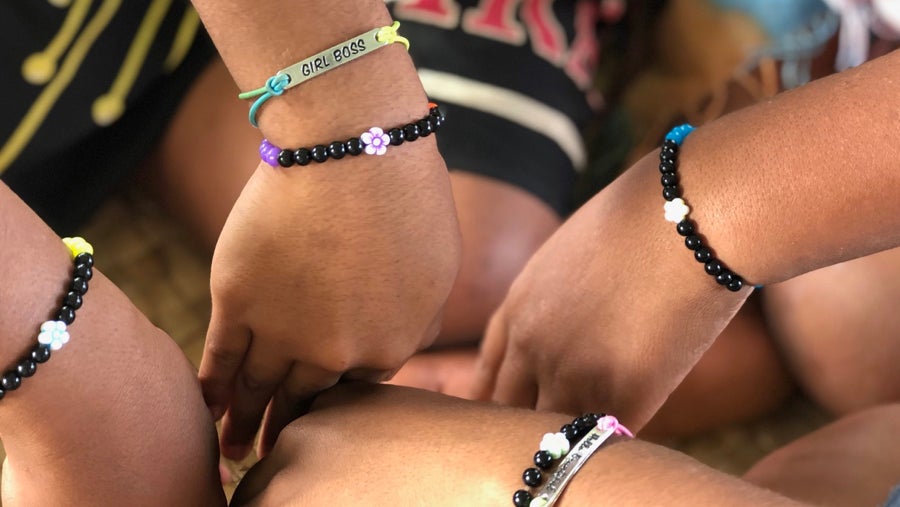
28 elements, 5 of which are coloured. The Menstruation Bracelet is a simple yet powerful symbol of solidarity for menstrual health, created by Menstrual Hygiene Day. It stands for our joint commitment to create a world, by 2030, where no woman or girl is held back from realising her full potential because she menstruates. A world where menstruation is just a normal fact of life. Where menstruation is not just a woman’s issue, but a universal issue. READ MORE
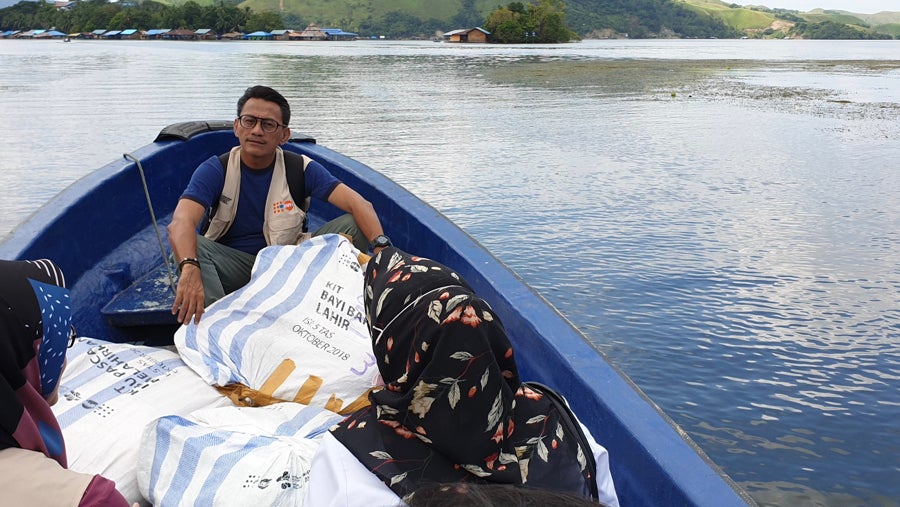
Indonesia: “I am proud of what we did because I know it saved lives,” says Allam Amin. He is a humanitarian worker who supports the most vulnerable people during emergencies and relief projects by coordinating logistics and supply chains for essential items like medicine, shelter, dignity kits and menstrual hygiene management kits. READ MORE
“Women and children come first during emergency situations. They are considered the most vulnerable.”
-Allam Amin, UNFPA Indonesia
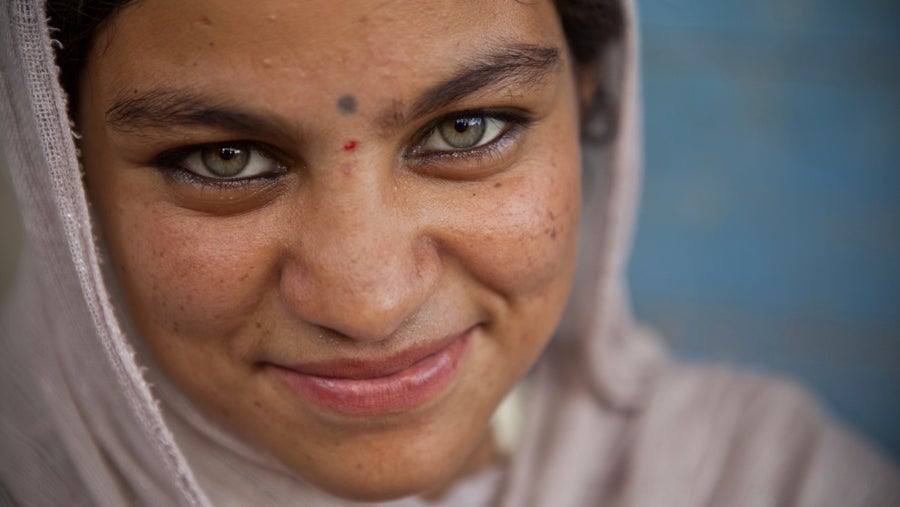
By ensuring safe and effective means of managing menstrual health in emergencies, UNFPA is supporting the fundamental right of women and girls to manage their menstruation with dignity, contributing to their overall health and wellbeing. ©UNFPA/Afghanistan
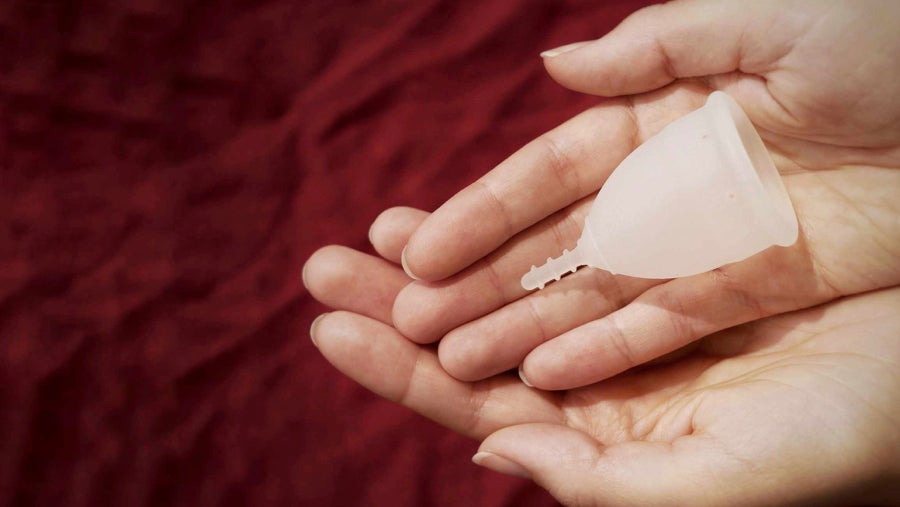
A menstrual cup is a type of reusable feminine hygiene product. It’s a small, flexible funnel-shaped cup made of rubber or silicone that you insert into your vagina to catch and collect period fluid. Cups can hold more blood than other methods, leading many women to use them as an eco-friendly alternative to pads and tampons. And depending on your flow, you can wear a cup for up to 12 hours. ©Vulvani
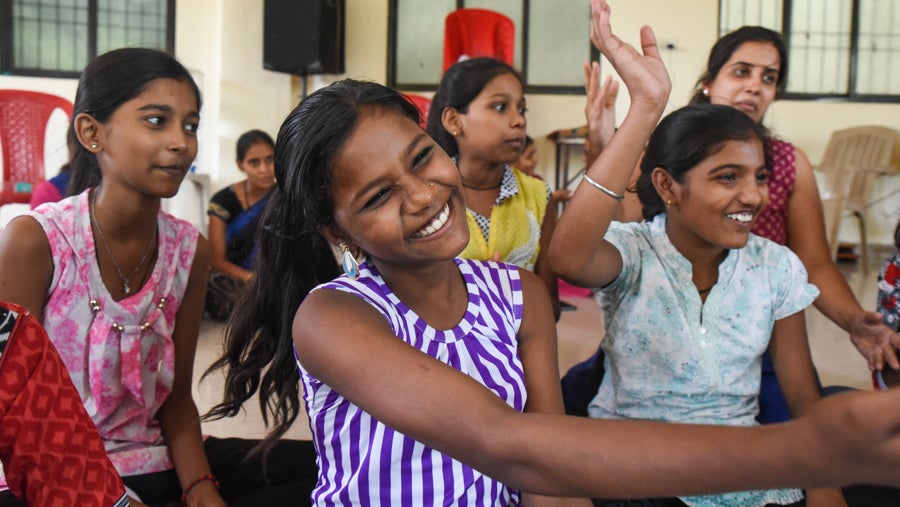
India: Menstrual health in emergencies enables women and girls to participate in daily activities such as school and livelihood activities, benefit from humanitarian aid distributions and contribute to the rebuilding of their communities. ©UNFPA/India READ MORE
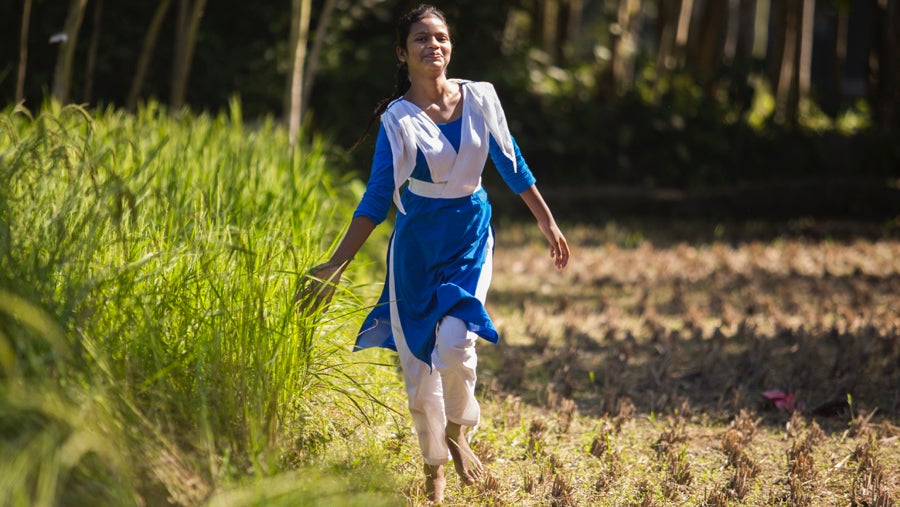
Bangladesh: "As girls, we suffer silently when it comes to our period,” says Rokeya from Gaibandha. “There have been times when I have not gone to school during my period because I was in so much pain. I also feared staining my clothes, but because we are poor, I did not know how to convince my father to get me pads.”
Rokeya says talking openly about menstruation helped her learn from others about the health impacts.
“Talking to the volunteers helped me and my friends to understand that menstruation is something that we shouldn’t shy away from,” she says. “They made us understand that menstruation is natural and we need extra support during it. They also convinced us that menstrual hygiene is important for our health or else it could cause infections and lead to worse diseases.”
Rokeya received a menstrual hygiene management kit from Plan International with UNFPA. “It had sanitary napkins, soaps, disinfectants, fresh cloth and pants. These products have helped me a lot in maintaining my menstrual hygiene." ©Plan International Bangladesh
Learn more
Menstruation and human rights - Frequently asked questions
https://www.unfpa.org/menstruationfaq

